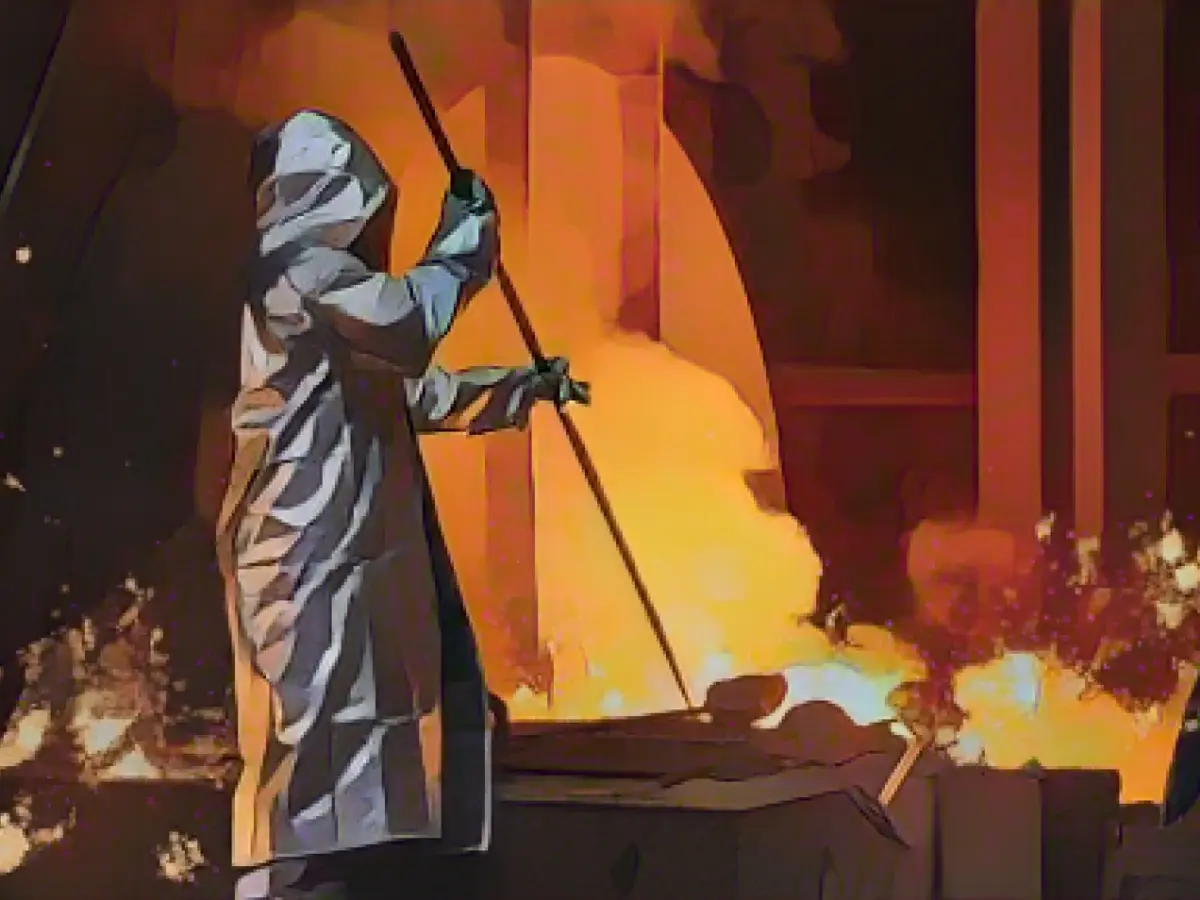Tariffs - Agreement in the steel industry: bonus and 5.5 percent wage increase
Employers and IG Metall reached an agreement on a new collective wage agreement in the north-west German iron and steel industry on Saturday morning. It provides for an inflation compensation bonus totaling 3,000 euros as well as a 5.5 percent increase in wages and salaries from January 1, 2025, as announced by IG Metall in Düsseldorf. The collective agreement runs until September 30, 2025.
On the subject of working hours, the parties also agreed on a collective agreement to safeguard jobs. It is to be applied if fewer workers are needed due to the planned conversion of production towards climate neutrality. This applies, for example, to coking plants whose coke will one day no longer be needed in hydrogen-powered plants.
The agreement provides for working hours to be reduced by three hours from the standard 35 hours to 32 hours. IG Metall was unable to achieve full wage compensation for this, but was able to achieve payment of 33 hours. In the event of additional demand, for example due to the temporary parallel operation of old and new technologies, working hours can also be increased by up to three hours. The existing regulation on overtime pay will then apply.
The agreement also provides for the possibility of reducing individual working hours to 33.6 hours, but without wage compensation. Only those aged 60 and over who work shifts will then be paid 34.1 hours.
The agreement was reached in the 5th round of negotiations after around 14 hours of marathon negotiations in Düsseldorf. It is regarded as a pilot agreement for the steel industry.
The peace obligation ended at the end of November. Since then, several tens of thousands of steelworkers have taken part in warning strikes lasting several hours. In the past few days, the union had called for 24-hour warning strikes, including in Duisburg, Europe's largest steel location.
Around 68,000 people are employed in the steel and iron industry in North Rhine-Westphalia, Bremen and Lower Saxony. In the East German steel industry, with around 8,000 employees, the 5th round of negotiations is scheduled for December 18.
In the Saarland steel industry, with around 15,000 employees, collective bargaining has not yet begun. There, the peace obligation ends at the end of February. In addition to Saarland, the collective bargaining area also includes two plants in Wetzlar (Rhineland-Palatinate) and Kehl (Baden-Württemberg).
The union had entered the negotiations with demands including a wage increase of 8.5 percent over a twelve-month period. It had also demanded a 32-hour week with full pay compensation.
Read also:
- A clan member is punished here
- Traffic lawyer warns: Don't talk to the police!
- Will he be convicted as Jutta's murderer after 37 years?
- He also wanted to kill his cousin
- The steel industry in North Rhine-Westphalia, along with Bremen and Lower Saxony, employs approximately 68,000 people and will receive an inflation compensation premium of 3,000 euros, as well as a 5.5% wage increase from January 1, 2025, according to the new collective wage agreement.
- The agreement in the steel industry also includes provisions for a reduction in working hours from 35 to 32 hours, with partial wage compensation, and the possibility for additional hours during peak demand, adhering to overtime pay regulations.
- Due to the planned conversion towards climate neutrality, coking plants in the steel industry, whose coke will no longer be needed in hydrogen-powered plants, will be subject to the job safeguard collective agreement.
- The steel industry agreement was reached after 14 hours of intense negotiations in Düsseldorf, Germany, and is considered a pilot agreement for the industry, setting a precedent for future wage and employment negotiations.
- Following the end of the peace obligation, numerous steelworkers in North Rhine-Westphalia, Bremen, and Lower Saxony have participated in warning strikes, demanding better wages and working conditions.
- While tariffs were agreed upon in the steel industry, negotiations in the Saarland steel industry, with around 15,000 employees, are yet to begin, with the peace obligation ending in February.
- The employer and IG Metal, the metalworkers' union in Germany, have been involved in collective bargaining in various regions of the country, including Düsseldorf, Duisburg, Wetzlar, and Kehl, to ensure fair compensation and working conditions for the steel industry workforce.
Source: www.stern.de








